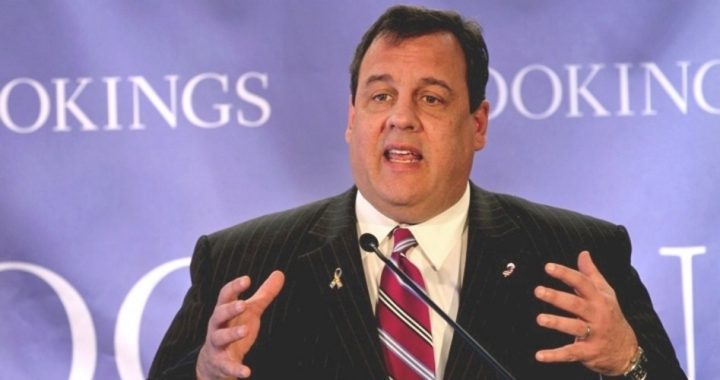
Citing his pro-life beliefs, New Jersey Gov. Chris Christie, a Republican, became the latest political leader to slam the current “war on drugs” as a “failure.” Instead of putting illegal-drug users in prison, first-time non-violent offenders should be sentenced to mandatory treatment and rehabilitation programs, the GOP governor argued during a speech at the Brookings Institution this week.
The remarks came in the wake of a new law in New Jersey seeking to reform some elements of the state’s dealings with addicts and narcotics users. Passed overwhelmingly by the legislature last month but criticized by Gov. Christie for its “piecemeal” approach, the measure creates a pilot program ordering certain people caught with drugs into a year-long treatment regime instead of imposing criminal penalties.
“The war on drugs, while well-intentioned, has been a failure,” Gov. Christie argued in his speech. “If you’re pro-life, as I am, you can’t be pro-life just in the womb. Every life is precious and every one of God’s creatures can be redeemed, but they won’t if we ignore them.
According to Gov. Christie, the new program makes sense in economic terms, too, potentially saving taxpayers vast sums of money over time. “It costs us $49,000 a year to warehouse a prisoner in New Jersey state prisons last year,” he explained. “A full year of inpatient drug treatment costs $24,000 a year.”
Despite Gov. Christie’s pleas, Democrat lawmakers were hesitant to expand the scheme even further due to worries about the price tag, according to news reports. However, if it the pilot program proves to be more successful than prisons, after further study, it could be rolled out across the whole state in the coming years.
“We’re warehousing addicted people every day in state prisons in New Jersey, giving them no treatment,” Gov. Christie said. “We have the obligation to understand that addiction is a disease and that we need to give people a chance to overcome that disease and restore dignity and meaning to their lives.”
“You can certainly make the argument that no one should try drugs in the first place, I certainly am in that camp,” he continued. “But tens of millions of people in our society do every year, and for some people they can try it and walk away from it, but for others, the first time they try it they become an addict, and they’re sick and they need treatment.”
The Governor’s comments come amid polls showing declining public support for the drug war and a New York Times article this month highlighting the numbers involved — the cost, the price of drugs, rates of drug use, and more. What the figures should show policy makers and drug warriors, the Times reported, is that “the struggle on which they have spent billions of dollars and lost tens of thousands of lives over the last four decades has failed.”
Across Latin America, where tens of thousands have died just in recent years, the drug war is coming under increasing pressure as well. Critics say it leads to violence, powerful drug cartels, higher rates of abuse among children, mass corruption, and other problems. Numerous heads of state and government throughout Central and South America have recently called for an end to the war despite billions in taxpayer aid for the battle provided by the U.S. government.
Even within the United States itself, pressure to re-think the drug war is growing. More than a dozen states have already nullified certain federal drug laws by legalizing medicinal marijuana, for example. Others are contemplating full-blown legalization this year, and prominent conservatives like Pat Robertson have announced their support for decriminalization.
When President Obama broke his campaign promises and stepped up federal efforts to quash the state-based reform movement, lawmakers on both sides of the aisle spoke out forcefully, blasting the administration’s “zealous and misguided war on medical marijuana.” Analysts said it was part of an accelerating trend of opposition to the unconstitutional war coming from conservatives and liberals alike.
In recent months, criticism of the drug war has accelerated further after the Drug Enforcement Administration (DEA) was exposed laundering drug profits — which Congress is still trying to investigate — and killing civilians in Latin America. The Central Intelligence Agency (CIA) has also come under suspicion in the expanding scandals surrounding U.S. government involvement in drug and weapons trafficking.
As the tide turns, Gov. Christie’s comments were widely applauded across the political spectrum. Some anti-drug war activists, however, slammed the speech, seeing the move in New Jersey not as a legitimate effort to bring the increasingly unpopular and failed war to a close, but instead as a deceptive scheme to perpetuate it in a new way.
“He, like prohibitionists on both sides of the political aisle, still agree with the goal of the Drug War — that the government should, by force, prevent citizens from using drugs that lack the bar codes of major corporate campaign contributors,” complained Russ Belville, a long-time advocate of marijuana legalization. “In case you’ve missed it, drug warriors have become quite aware of the polls showing Americans are sick of the Drug War.”
According to Belville, forcing adult drug users to undergo a year of mandatory “treatment” at a rehab center is not only ineffective and costly, but immoral. It is also hypocritical, he said, pointing to the government’s dealings with alcoholics — who are not forced into treatment involuntarily unless they commit a crime tied to intoxication.
“They are terrified the American people might start putting an end to the endless war that provides jobs for prison guards and extra-constitutional powers for police, easy ‘tough on crime’ speechifying for politicians, and suppresses competition to energy, pharmaceutical, timber, and food megacorps,” Belville wrote. “So their mantra now has changed to what I call ‘The Kinder, Gentler Drug War.’”
While speaking at the Washington, D.C.-based Brookings Institution, Gov. Christie also criticized ObamaCare, the federal healthcare bill that has numerous governors threatening to invoke nullification. However, Christie expressed “relief” that the Supreme Court had ruled “extortion” was still illegal, referring to the Court’s ruling against provisions in the controversial statute purporting to order state governments to expand Medicaid.
“It was in a whole bunch of nice words in the bill, but it was extortion,” he said. “So I’m really glad that the majority of the Supreme Court still supports the proposition, as the former prosecutor, that extortion is still illegal in the country, even when done by the President of the United States.”
Gov. Christie has drawn mixed feelings from conservatives during his political career. Some believe him to be a stalwart champion of conservatism and potentially even a good GOP candidate for President, at least at some point in the future. Others are less than enthusiastic, however, with some critics even referring to him as a RINO — Republican in Name Only.
As with most other issues, presumptive GOP presidential nominee Mitt Romney has held various positions on both the drug war and the health-insurance mandates he pioneered as Governor of Massachusetts. His most recent comments on the war, however, indicate that he now thinks the federal government should “continue our war on drugs from a police standpoint” and “market again to our young people about the perils of drugs.” He also claims to support repealing and replacing ObamaCare.
Analysts have long said that the decades-long, United Nations-mandated drug war would inevitably come to an end. In some countries like the Czech Republic and Portugal – which legalized all drugs and has seen decreasing rates of drug use and plunging crime rates – it already has.
Whether Gov. Christie’s statements illustrate the beginning of the end for the war or simply a shift in tactics is still not clear. Either way, though, his landmark speech and the new law in New Jersey are certainly significant to both critics and supporters of the war.
Related articles:
State Lawmakers Blast Obama’s War on Medical Marijuana
Pat Robertson Calls for Marijuana Legalization
Colorado Poised for Ballot Measure to Legalize Marijuana
The Other Unconstitutional War
Outrage Grows After U.S. Drug War Kills More Honduran Women, Children
Top UK Officials: UN-inspired War on Drugs Failed
Calderon: U.S. Officials Involved in Drug Trade
Despite Mounting Regional Pressure, Obama Vows More Drug War
Latin America Debates Drug Legalization; Obama Demands More War on Drugs
Reports: CIA Working with Mexican Drug Cartels
Photo: Same venue, last year: New Jersey Gov. Chris Christie at the Brookings Institution on April 7, 2011: AP Images



